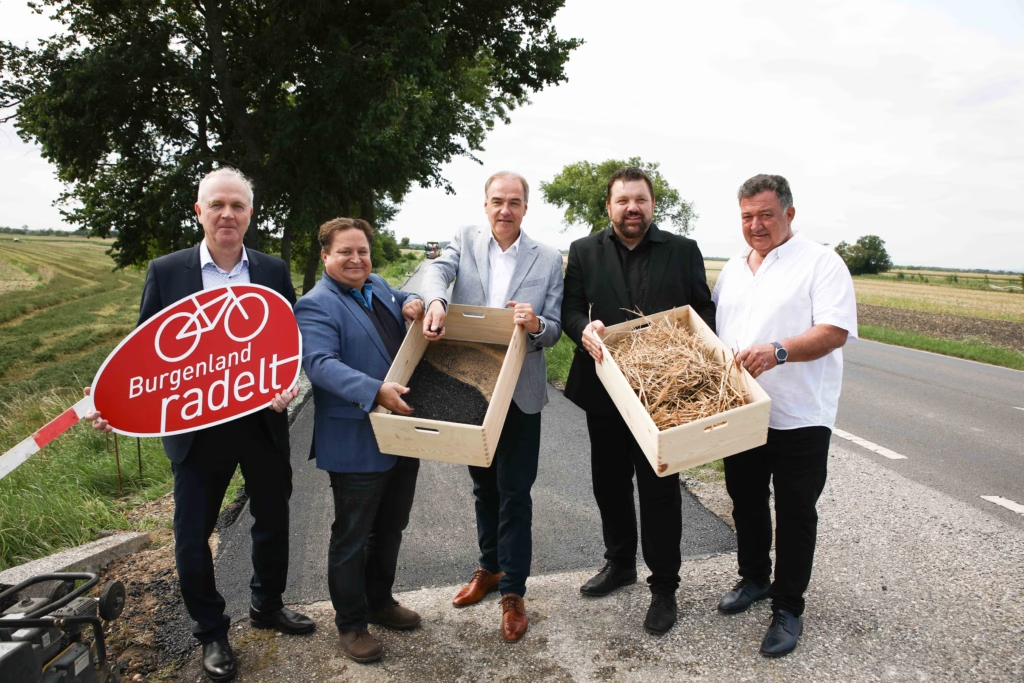An innovative model project for active CO₂ reduction and promotion of the circular economy was launched in the Burgenland municipality of Pamhagen.

Image source: Burgenland State Media Service
In the Burgenland municipality of Pamhagen, Austria's first cycle path is being built as a pilot project using a novel, CO₂-storing road construction material based on biochar. The goal of the project is the development and application of a climate-friendly, permanently CO₂-binding asphalt, which, in the next development stage, will not only be CO₂-negative but also water-permeable, thus counteracting soil sealing. "This pilot project combines innovative climate protection with regional development and serves as a model for future infrastructure projects – from cycle paths and sidewalks to town squares, state roads, and tourist infrastructure. At the same time, it contributes to promoting the circular economy and regional value creation by ensuring high-quality utilization of regional waste materials. With the first biochar-asphalt cycle path, Burgenland is once again becoming a pioneer for innovative and sustainable technologies. The state's goal is to be climate-neutral by 2030. This project is a further building block in this process," emphasizes State Councilor Leonhard Schneemann, who will present details of the project together with Christian Rauch, Head of Technology Management & Innovation at PORR Bau GmbH, and the research coordinator of the state of Burgenland, project manager Martin Zloklikovits.
Climate protection with regional added value
At the heart of the new material is biochar from regional agricultural residues – such as reeds – which is permanently stored in the road surface as a carbon sink. Production, mixing, and construction are all carried out entirely in Burgenland, at the asphalt mixing plant of PORR Bau GmbH in Pamhagen. "Our first task was to develop recipes for the asphalt mixture that could also be implemented," emphasizes Christian Rauch. Rauch is pleased with the cooperation between the state and PORR Bau GmbH on the project: "Innovation, sustainability, pioneering spirit, and reliability are an integral part of our corporate culture." The developed recipes – the development work was carried out in the in-house laboratory at the plant in Parndorf – have been applied since Monday in sections along the cycle path in Pamhagen, covering a total length of around one kilometer. "Now we will observe and analyze how the material behaves over the course of a year under a variety of weather conditions," says Rauch.
"The project not only contributes to climate protection but also to regional value creation, as the biochar used is locally produced," says project manager Martin Zloklikovits. The innovative asphalt binds CO₂ in the long term, thus actively counteracting climate change. "With a carbon content of up to 5 % in the asphalt, up to 1.4 million tons of CO₂ could be permanently stored in green asphalt in Austria each year. Over 60 tons of CO₂ are permanently bound per kilometer of cycle path. This is a significant contribution to reducing CO₂ in the atmosphere through the widespread use of 'green asphalt,'" explains Zloklikovits.
"The 'Green Cycle Path' in Pamhagen serves as a demonstration project for future applications in Burgenland and beyond – a groundbreaking step toward climate-friendly mobility and sustainable construction. With this project, we are setting a milestone for sustainable infrastructure development and creating real benefits for the environment, the region, and the population," emphasize the project managers.
Water permeability and increasing the recycled content in asphalt
In a further development step, the material will become water-permeable and have an even higher recycled content – a further contribution to sustainable and ecological construction and to the reduction of surface sealing, says Zloklikovits.
A strong network for innovation and the environment
The project is a cooperation between the Burgenland Business Agency for Research and Innovations GmbH, the State of Burgenland, and PORR Bau GmbH. Strategic partners are Lake Management Burgenland, the company Sonnenerde in Riedlingsdorf, and the University of Leoben. The project manager is Martin Zloklikovits, research coordinator for the State of Burgenland.
